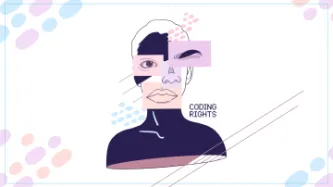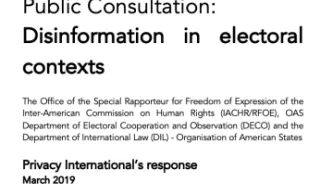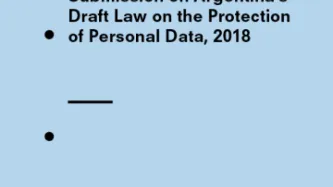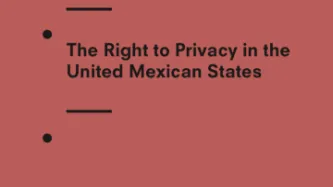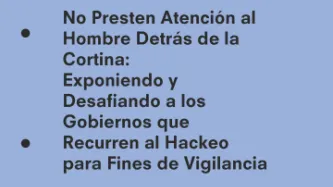Search
Content type: News & Analysis
Also available in English.A Relatora Especial da ONU sobre o Direito à Educação publicou seu relatório sobre liberdade acadêmica - que, entre outras coisas, recomenda que os Estados banam as tecnologias de reconhecimento facial das instituições educacionais.O sistema educacional do Brasil, que se baseia no valor fundamental “o melhor interesse da criança” é um dos piores infratores do mundo. Até o momento, 1.667 escolas só no estado do Paraná adotaram uma tecnologia que, segundo o principal…
Content type: News & Analysis
Também disponível em portuguêsThe UN Special Rapporteur on the right to education published her report on academic freedom, which recommends that states ban facial recognition technologies from educational institutions.Brazil’s educational system - which is built on the fundamental value: the best interest of the child, is one of the world’s worst offenders. So far 1,667 schools in the state of Paraná alone have adopted a technology that the UN’s leading expert believes threatens student’s…
Content type: Examples
Human Rights Watch called on the national government of Brazil to amend the country's data protection law to add new safeguards to protect children online following the discovery that seven educational webistes directed at Brazilian students, including two created by state education secretariats, used tracking developed for advertising purposes to surveil children, harvested their personal data, and sent it to third-party companies. The websites watched children in their online classrooms and…
Content type: Examples
Following a report from Human Rights Watch, The Public Ministry of São Paolo began an investigation to find out whether government education platforms and services collected students' personal data and sent it to adtech companies in violation of the General Data Protection Law. Article: São Paolo ministry investigates education websites for dataveillance Publication: G1Writer: Arthur Stabile
Content type: Examples
Education experts and publishers in Brazil are warning of the negative consequences of a decision by the São Paolo state government to replace textbooks with ebooks for students over 14 starting in 2024. Many students have no Internet access, and publishers argue it will irreparably damage the testbook industry.Article: Brazilian educators oppose ebook replacement for textbooks Publication: Phys.org Writer: Phys.org
Content type: Examples
After an in-person auction in São João let Brazilian technology companies bid for a contract to supply facial recognition technology to the public school system. PontoID, which won the $162,000 contract, began secretly rolling out the technology without informing parents or students in advance. The goal was to help track school attendance; parents would receive a text message when students arrive and leave school. In some towns, more than 80% of the population are of African descent; facial…
Content type: News & Analysis
This blog post by Coding Rights was originally published in Portuguese at: https://tinyurl.com/mediumcodingrightsTransID. It was written by Mariah Rafaela Silva and Joana Varon and translated by Erly Guedes. Illustration was produced by Clarote.On the International Transgender Day of Visibility, Mariah Rafaela Silva and Joana Varon authors of the report “Facial recognition in the public sector and trans identities: techno-politics of control, surveillance and threats to gender diversity…
Content type: Examples
Corruption scandals have added to Latin America’s challenges in dealing with the coronavirus. In Ecuador, prosecutors identified a criminal ring that colluded with health officials to sell body bags to hospitals at 13 times the normal price, and many others are accused of price-gouging for other medical supplies.
The former Bolivian health minister is under house arrest awaiting trial on corruption charges, government officials in seven Brazilian states are under investigation for misusing…
Content type: Examples
Brazil’s Federal Supreme Court has struck down a government order forcing telecommunications companies to provide access to the user information relating to the country’s 200 million citizens to enable the government to conduct phone interviews to determine the economic response to the COVID-19 pandemic. In the process, the ruling established that data protection is a fundamental right. However, privacy advocates warned that the lack of established data protection law in the country opened the…
Content type: Examples
As the mounting infection numbers and deaths took Brazil to second-worst affected in the world, the country took down the website on which it had been publishing daily, weekly, and monthly figures non infections and deaths in Braziliant states. A newspaper that supports president Jair Bolsonaro implied that some states were exaggerating the toll, and a council of state health secretaries said it would fight the changes. Two days later, the country restored the site after the Supreme Court…
Content type: Examples
Brazilian supreme court judge Alexandre de Moraes ordered Jair Bolsonaro’s administration to resume publishing complete COVID-19 statistics. The government had purged the health ministry website of historical pandemic-related data and said it would stop publishing the cumulative death toll and number of infections in order to “refine” the official data. Independent media estimated the tally at 37,312 deaths and 710,8987 infections; Bolsonaro accused the media of creating a panic.
https://www.…
Content type: Examples
Taking advantage of the pandemic to close US borders, the Trump administration is also spreading coronavirus infection by deporting detainees to receiving countries such as Guatemala, where 20% of infections are deportees. Guatemala has only two hospitals and a scattering of smaller regional medical facilities to serve its population of 18 million people. As of April 2020, 5,000 Guatemalans were being held in detention in the US, and every week the Department of Homeland Security was sending…
Content type: Examples
INTERNETLAB offers an extensive analysis of all the eight different Covid-19 related apps being discussed in Brazil at the moment. Apps were rated according to four parameters: consent, need, transparency and security. Besides this, the organisation takes a look into what permissions which app has and analyses these permissions in light of what the apps promise to deliver.
Writer: Alessandra Gomes, Maria Luciano, Nathalie Fragoso e Victor Pavarin
Publication: INTERNETLAB
…
Content type: Examples
The global pandemic that has been declared by COVID-19 is already affecting countries of Latin America and the Caribbean. Recognizing the seriousness of this health crisis and the legal possibility for governments to take exceptional measures to control the pandemic, it is essential to remember that these must be carried out in strict accordance with human rights standards.
Signed by AlSur, a consortium of 11 civil society organizations and academia from various Latin American and Caribbean…
Content type: Examples
Our partners from Coding Rights in Brazil analysed 18 different Bills introduced to the Congress to deal with the COVID-19 pandemic (in Portuguese).
Link: https://www.codingrights.org/radar-legislativo-especial-covid-19-e-tecnologia/
Content type: Examples
Our partners from Internet Lab in Brazil started a series of podcasts to discuss the impacts of COVID-19 in the country. They are all recorded and available in the website (in Portuguese).
Link: https://www.internetlab.org.br/pt/noticias/antivirus-um-programa-para-discutir-a-tecnologia-direitos-e-a-pandemia/
Content type: Examples
In Colombia, Peru, and Panama, quarantine regulations assign men and women different days to go out. For transgender people, these gender-based restrictions mean discrimination and violence for law enforcement and others, leading to numerous complaints. In Bogota, where law enforcement has been instructed not to demand ID to prove gender and trans people are allowed to choose their day, one trans woman was stabbed by a man who said she was out on the wrong day, and another was blocked from…
Content type: Examples
In Haiti, the National Identification Office has been extremely crowded, despite the government requirement to avoid gatherings of more than 10 people. The cards, which include a photo, name, date of birth, and registry number, are required for bank transactions and other official purposes.
Source: https://www.voanews.com/science-health/coronavirus-outbreak/haitians-seeking-national-id-cards-say-government-violating-its
Writer: Sandra Lemaire and Matiado Vilme
Publication: VOA News
Content type: Examples
The Guatemalan government is using the app Alerta Guate to spread public health information, which was created by the Chicago-registered company In-telligent LLC. The app is allowed to collect each user's email address, social media account handles, age, personal interests, and geographic location, and asks permission to access files, calls, and audio, among others. The president has said he wants to ensure that citizens keep the app installed so it can be used later for other purposes such as…
Content type: Examples
The Rio de Janeiro City Hall has signed an agreement with telecomunications company TIM to use geolocation data to develop "heat maps" by cross-referencing epidemological hubs with high population density locations. Under the agreement, TIM will pinpoint the movement of its users across Rio de Janeiro through antennae-facilitated geolocation triangulation and send it online to the local government to enable it to monitor whether individuals are complying with isolation measures and assess…
Content type: Examples
In February 2019, the city of Rio de Janeiro announced that its police security operation for the annual five-day Carnival would include facial recognition and vehicle license plate cameras to identify wanted individuals and cars. Municipal officials said the system would help reduce thefts and robberies; critics dissented on the basis that a period when people are wearing masks, heavy makeup, glitter, and costumes is a bad time to test the technology.
https://riotimesonline.com/brazil-news/…
Content type: Examples
In November 2018 reports emerged that immigrants heading north from Central America to the US border are more and more often ensuring they are accompanied by children because "family units" are known to be less likely to be deported, at least temporarily, and smugglers charge less than half as much when a minor is in the group because their risk is less. Some parents have given their children - sometimes for cash - to other adults such as a relative, godparent, or, sometimes, unrelated person.…
Content type: Advocacy
Consultation Submission
In March 2019, Privacy International submitted a response to a consultation on Disinformation in Electoral Contexts, led by the Office of the Special Rapporteur for Freedom of Expression of the Inter-American Commission on Human Rights together with the Department of Electoral Cooperation and Observation (DECO) and the Department of International Law (DIL) of the Organisation of American States (OAS).
In our submission we highlighted the importance of minmising data…
Content type: News & Analysis
Creative Commons Photo Credit: Source
In the third episode of the Gender and Privacy Series, we talk about sex and privacy with two female activists: Sarah Jamie Lewis, an expert on the security of internet-connected sex toys, and Joana Varon, founder of the female-led Brazilian NGO Coding Rights.
Listen to the podcast here.
Content type: Long Read
During the last World Economic Forum in Davos, the CEO of Microsoft joined the chorus of voices calling for new global privacy rules, saying the following in regard to the new European General Data Protection Regulation (GDPR):
“My own point of view is that it's a fantastic start in treating privacy as a human right. I hope that in the United States we do something similar, and that the world converges on a common standard."
We have come a long way. From tech companies fighting and…
Content type: State of Privacy
Table of contents
Introduction
Right to Privacy
Communication Surveillance
Data Protection
Identification Schemes
Policies and Sectoral Initiatives
Introduction
Acknowledgement
The State of Privacy in Brazil is the result of an ongoing collaboration by Privacy International and Coding Rights.
Between 2014-2017, Privacy LatAm contributed to previous versions of this briefing.
Key privacy facts
1. Constitutional privacy protection: The constitution contains an explicit…
Content type: Advocacy
In September 2018, the National Executive sent the proposed Data Protection Bill to the National Congress. The proposed law was directed to the Senate and it will be considered by two commissions: the Commission of Constitutional Affairs (Comision de Asuntos Constitucionales) and the Commission of Rights and Guarantees (Comision de Derechos y Garantías).
Privacy International welcomes the continued efforts by Argentina to provide protections for the right to privacy, already enshrined in the…
Content type: News & Analysis
This month Brazil adopted a new data protection law, joining the ranks of more than 120 countries which have adopted such legislation, providing individuals with rights against the exploitation of their personal data. But after a veto from the Brazilian president, the law lacks an independent authority in charge of its application, which can severely undermine its impact.
When drafting data protection bills, one of the most important and often politically contentious issue tends to be their…
Content type: Advocacy
This report is presented by Red en Defensa de los Derechos Digitales (R3D) and Privacy International (PI). La Red en Defensa de los Derechos Digitales (R3D) is a non-governmental, non-profit organisation located in Mexico, dedicated to the defence of human rights in the digital environment. Privacy International (PI) is a non-governmental, non-profit organisation located in London, focused on the defence, promotion and protection of the right to privacy around the world.
PI and R3D wish to…
Content type: Advocacy
Tanto la privacidad como la seguridad son esenciales para proteger a los individuos, su autonomía y su dignidad. El detrimento de la privacidad implica el detrimento de la seguridad de los individuos, sus dispositivos y la infraestructura de la que forman parte. La gente necesita privacidad para sentirse libremente segura y proteger su información, así como para gozar plenamente de otros derechos.
Una cantidad cada vez mayor de Gobiernos en el mundo está recurriendo también al hackeo para…

